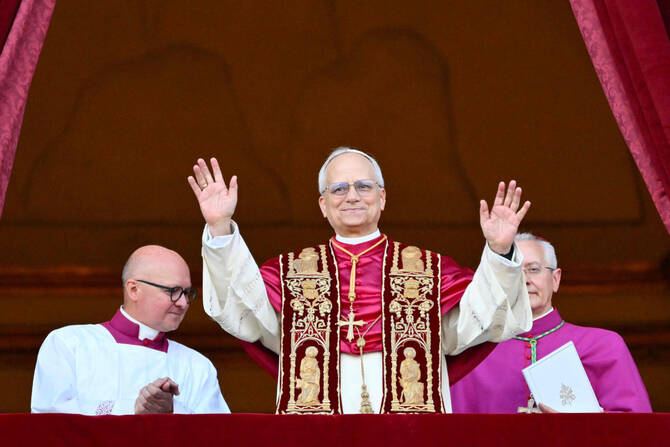
- ARAB NEWS
- 21 Aug 2025

The election of Pope Leo XIV marks a decisive moment of renewal for the Catholic Church. It is not a return to nostalgia, but a living rediscovery of its deepest identity: to be a missionary Church, always going forth, always in dialogue, always listening to the cries of the world, and responding with humility, joy, and hope.
From his first words, Leo has expressed a clear desire to return to what is essential: the simplicity of the Gospel, the centrality of Christ, and a commitment to the poor and forgotten. He seeks neither power nor prestige, but witness. And that witness has been shaped over a life marked by mission, study, service, and communion.
This missionary spirit is not a mere theoretical stance — it is something Pope Leo embodies. His very identity reflects the universality of the Church: he is the first US citizen and the first citizen of Peru to be elected pope, shaped by the Americas, Spain, Italy, and France. He belongs to many cultures and yet is not bound to any one nation. In him, the Catholic Church reclaims its name in the truest sense: a Church for all, not defined by borders or flags, but by Christ alone. His background speaks silently but powerfully of a Church that excludes no one and walks alongside all peoples.
Before his election, Leo was Superior General of the Order of Saint Augustine. Deeply rooted in the spiritual and intellectual legacy of Saint Augustine of Hippo, he helped revitalize the order with a renewed focus on contemplative interiority, fraternal life, and service to the peripheries. Under his leadership, the Augustinians became a quiet but bold presence in universities, in impoverished neighborhoods, and in areas of conflict — living out the Augustinian conviction that the heart is restless until it rests in God.
His years in Peru were formative, offering firsthand experience of both deep poverty and vibrant popular faith. There, he worked among indigenous communities, urban poor, and young intellectuals alike. He listened before preaching, learned before teaching, and walked humbly among those who bore the marks of Christ in their suffering. From the Andes to the Amazon, his ministry in Peru taught him the language of compassion and the wisdom of the margins.
As bishop of Chiclayo in Peru, a diocese modest in size but rich in Christian history, Leo displayed remarkable pastoral sensitivity and moral clarity. He strengthened local communities through social outreach, promoted dialogue with other faiths, and supported initiatives that placed the dignity of the worker at the center of Church engagement. It was no surprise, then, that upon his election, he referenced “Rerum novarum,” or “Of revolutionary change,” the landmark encyclical of Pope Leo XIII issued 134 years ago next week — a timely reminder that the Church must speak prophetically about justice.
Pope Leo has extended a hand of friendship to the Islamic world and to the Eastern churches … he speaks not of confrontation but of hope.
Rafael Hernandez de Santiago
Like Leo XIII, Pope Leo XIV does not fear the truth. He addresses the inequalities and injustices of the global economy with clarity and conviction. He speaks of the suffering of migrants, of workers without protections, of families crushed by economic systems that favor profit over human dignity. For him, the Church’s social teaching is not a footnote to the Gospel — it is an expression of it. In speaking truth with love, he reminds us that charity and justice must go hand in hand. It is no small providence that on Feb. 6 Pope Leo was assigned the suburbicarian see of Albano, in Rome — the same seat once held by Leo XIII, linking their pontificates across time in a shared vision of truth, justice, and renewal.
But his vision does not stop with Latin America. Since his election, Pope Leo has extended a hand of friendship to the Islamic world and to the Eastern churches. He speaks not of confrontation but of hope; not of fear but of peace. He recognizes the deep spiritual heritage of Islam and expresses sincere respect for its worship of the one God. He understands the Eastern churches not as fragments, but as treasures — with traditions and insights that the Roman Church must embrace to truly breathe with both lungs, as Pope John Paul II once said.
This is not a pope who desires to homogenize the Church or the world. Rather, he seeks to reconcile, to foster fraternity, to build a future where differences are not threats but bridges. He envisions real encounters — beyond mere protocol — where truth is spoken and received in love, and where wounds can begin to heal through trust and grace.
In many ways, Pope Leo represents a return to the beginning: a Church that is small, poor, brave, and passionately in love with Christ. Yet at the same time, he opens new paths into the future: a Church that walks with every people and nation, that speaks the language of the heart, and that dares to hope.
This is not regression. It is rediscovery. And only a Church that remembers where it came from can truly flourish again. Like his namesake, Leo XIV steps into history not to preserve comfort, but to stir conscience, drawing from the wellspring of Saint Augustine, who reminds us: “In essentials, unity; in non-essentials, liberty; in all things, charity.” And as Augustine also said: “Do not desert the road of humility if you wish to reach the eternal heights.” It is along that humble, missionary road that Pope Leo now leads the Church — toward unity, peace, and coexistence through dialogue and hope.